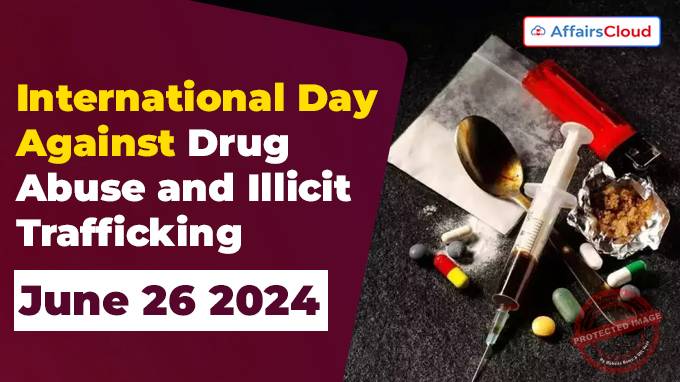 The United Nations (UN) International Day Against Drug Abuse and Illicit Trafficking (also known as World/International Drug Day) is annually observed across the globe on 26 June to raise awareness of the significant societal issues caused by illicit drugs and strengthen action and cooperation for an international society free of drug abuse.
The United Nations (UN) International Day Against Drug Abuse and Illicit Trafficking (also known as World/International Drug Day) is annually observed across the globe on 26 June to raise awareness of the significant societal issues caused by illicit drugs and strengthen action and cooperation for an international society free of drug abuse.
- The UN Office on Drugs and Crime (UNODC) selects themes for World Drug Day and launches campaigns to raise awareness about the global drug problem.
The 2024 campaign theme of International Day Against Drug Abuse and Illicit Trafficking is, “The evidence is clear: invest in prevention.”
Significance of the 2024 Observance:
i.The 2024 campaign emphasises that effective drug policies should be grounded in science, research, respect for human rights, compassion, and an understanding of the social, economic, and health implications of drug use.
Background:
i.In December 1987, the UN General Assembly (UNGA) adopted the resolution A/RES/42/112 and decided to observe 26 June each year as the International Day Against Drug Abuse and Illicit Trafficking.
Note: The Day also honours Lin Zexu, a Chinese government official in the Qing Dynasty, who played a key role in eradicating the British Opium Trade in Humen, south China’s Guangdong Province, in 1839.
Global Drug Control Efforts:
i.The global drug problem was acknowledged in the early 20th century, with the 1st international conference on narcotic drugs taking place in Shanghai, China in 1909.
ii.3 UN drug control conventions were adopted namely, the Single Convention on Narcotic Drugs in 1961, The Convention on Psychotropic Substances of 1971 in 1971, and The UN Convention against Illicit Traffic in Narcotic Drugs and Psychotropic Substances in 1988.
UN Action:
i.The Commission on Narcotic Drugs (CND) was established in 1946 by the Economic and Social Council (ECOSOC), to assist ECOSOC in supervising the application of the international drug control treaties.
ii.The UNODC supports a balanced, health-based approach to drug issues.
iii.In 2009, Member States adopted the “Political Declaration and Plan of Action on International Cooperation Towards an Integrated and Balanced Strategy to Counter the World Drug Problem“, including goals and targets for drug control.
iv.In 2019, the CND adopted a Ministerial Declaration reaffirming their commitment to a drug-free society.
2024 Event:
The CND held a hybrid event commemorating the UN International Day against Drug Abuse and Illicit Trafficking and launched the 2024 UNODC World Drug Report (WDR).
- The event was held in a hybrid format on 26 June 2024, at the Vienna International Centre (VIC) in Austria and online.
2024 UNODC World Drug Report:
i.UNODC annually issues the World Drug Report (WDR) on World Drug Day (26 June), full of key statistics and factual data obtained via official sources, a science-based approach, and research.
ii.According to the report “World Drug Report 2024 :Harms of world drug problem continue to mount amid expansions in drug use and markets”, Overall, almost 292 million people or 1 in 18 of the world’s population used a drug in 2022, a 20 percent more than a decade earlier.
- Cannabis remains the most widely used drug worldwide (228 million users), followed by opioids (60 million users), amphetamines (30 million users), cocaine (23 million users), and ecstasy (20 million users).
iii.The 2024 WDR provides a comprehensive overview of global drug markets and includes the latest data on drug use, production, and trafficking.
iv.t also focuses on contemporary issues related to drugs, special chapters on the impact of the opium ban in Afghanistan, and more.
About the UN Office on Drugs and Crime (UNODC):
The UNODC was established in 1997 as a result of the merging of the UN Centre for International Crime Prevention and the UN International Drug Control Programme.
Executive Director– Ghada Fathi Waly
Headquarters– Vienna, Austria




